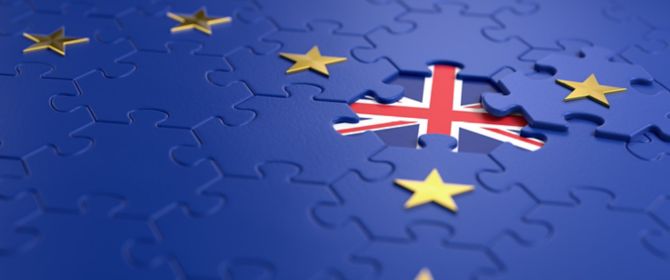The exit has taken place
On 24 December 2020, the United Kingdom and the European Union signed a Trade and Cooperation Agreement.
On 1 January 2021, the UK finally left the European Union. In order to manage economic collaboration, a transition period had been agreed until 31 December 2020. During this transition period, the United Kingdom continued to have access to the EU internal market (with all four basic freedoms) and remained part of the Customs Union, but as a quid pro quo, it had to continue to comply with existing EU rules (the EU acquis) and continue to pay financial contributions to Brussels. During this period, the United Kingdom also had to continue to accept all amendments to EU law. Meanwhile, the European Court of Justice continued to have jurisdiction.
What German and British companies expect from Brexit can be seen in our German-British Business Outlook 2021.
The time of uncertainty is now over: For the period from 1 January 2021, the 1,000 page long Trade and Cooperation Agreement settles many questions, including those surrounding trade in goods, services, intellectual property, fair competition (the so-called “level playing field”), transport and many others.
Trade between the European Union and the United Kingdom is now – provided specific rules of origin are met and documented correctly – not subject to duty or quantitative restrictions on import and export.
This in turn complicates business relationships in many areas. For the import and export of goods, bureaucracy is now built-in, as different standards now have to be checked. In addition, the agreement only covers a small area of services. In particular, the area of financial services is not regulated. This means the EU passport is lost. Some fundamental questions in this area should be settled in spring 2021.
In addition, workers have lost their freedom of movement. A visa is now required for stays of over 90 days. The mutual recognition of professional qualifications has also been lost.
The British need to continue to respect the existing EU standards, especially in the areas of environmental protection, social and employee rights for the main part. New EU standards, on the other hand, no longer have to be followed in all cases. However, if major differences develop, these might be eliminated by new forms of customs duty.
Companies who want to maintain business relations with Great Britain and Northern Ireland need to come to grips with the different Brexit topics now, if they did not already, so that they are equipped to proceed as smoothly as possible. The most relevant topics include the import and export of goods, mandatory customs registration and, above all, the necessary checking of the “Rules of Origin” in order to take advantage of exemptions from customs duty. You also cannot afford to ignore the area of taxes and social security. At the same time, there are a large number of legal aspects, such as the effects of company law and regulatory requirements, as well as labour law.
Our KPMG experts in Germany will be happy to help you with the important questions relating to Brexit.
Nikolaus Schadeck
Partner, Audit, Head of Country Practice United Kingdom
KPMG AG Wirtschaftsprüfungsgesellschaft

Strategic – Customers and Products
- It is absolutely necessary to check your own ability to deliver, and that of your suppliers
- Measures such as amendments to contracts, fair distribution of the additional financial costs arising from increased administrative charges (customs processing, storage and transport costs, demurrage etc.) need review, plus an evaluation of your position in the supply chain
Kaveh Taghizadeh, Partner, Value Chain Transformation
Our KPMG experts in Germany will be happy to help you with the important questions relating to Brexit.

Customs and foreign trade – Goods and deliveries
- Under the Trade Agreement: all companies will be affected by the customs handling of their goods
- Necessary registrations, instructing a customs broker, as well as changes to delivery documents/IT systems will be absolutely necessary in most cases to ensure that goods do not get blocked at the border
- You can read more about changes to customs legislation in our Brochure on Value Added Tax and Customs
Gabriel Kurt, Partner, Tax, Head of Trade & Customs
Our KPMG experts in Germany will be happy to help you with the important questions relating to Brexit.

Tax and legal – Regulatory framework
- Value added tax, excise duty, transfer pricing, tax registrations or tax rates are some of the key words that companies need to analyse sooner rather than later, in order to be able to reduce their negative consequences through suitable measures
- A detailed analysis of the social security legislation situation for cross-border employees. For existing cases, the arrangements under the Withdrawal Agreement will continue to apply. For foreign hirings from 1 January 2021, it will be the requirements in the Trade Agreement. Companies have to meet complex requirements and compliance rules, if they are to be in good order with the social security provisions
- All existing contracts need to be analysed to see if they remain valid post-Brexit – especially clauses defining jurisdictions need to be checked, since acceptance of judgements and their execution will no longer be as simple as it was previously
- Regulatory requirements to look out for: check carefully, as special permits, certificates, authorisations, certifications etc. will no longer be valid and will need to be re-applied for (e.g. chemicals, foodstuffs, electronic products) – Can I even continue to offer my services in the UK without them?
- Companies registered in the UK are regarded from 1 January 2021 as third-country business entities, and will no longer be automatically recognised. Existing British company forms in Germany will likely be treated as one of the available catch-all legal forms in Germany, such as OHG or GbR, in which case the company owner may be exposed to personal liability
- In terms of data protection, both the GDPR and the British DPA 2018 need to be complied with
- New EU laws have no effect in the UK any more. Intellectual property therefore needs to be protected separately in the UK – although existing standard EU rights continue to be protected
Dr Markus Gsödl, Partner, Tax, International Corporate Tax
Our KPMG experts in Germany will be happy to help you with the important questions relating to Brexit.

Financial
- The Trade and Cooperation Agreement may have implications for your overall strategy, and may mean you need to change your capital structure
- It is absolutely necessary to carry out sensitivity analyses and check the effects on cash flows, as the currently low interest rates and therefore also financing costs could change
- Scenario and gap analyses, along with benchmarking for relevant interest and exchange rates, are essential in order to check the impact of changes to financing costs due to overvaluation and changing spreads on your cashflow
Ralph Schilling, Partner, Risk & Treasury, Head of Finance and Treasury Management
Our KPMG experts in Germany will be happy to help you with the important questions relating to Brexit.

Balance sheet methods and analysis
- For assets that involve the United Kingdom (e.g. shareholdings, company valuations, debtors), the valuation principles must be checked – in case any of the planning assumptions, margin analyses and valuation models are no longer solid under the rules of the Trade and Cooperation agreement
- If the United Kingdom exits from the endorsement procedure, then the valuation principles of “EU IFRS” and “UK IFRS” will drift apart – the impact should be evaluated in good time
- Explanations may be required in the Management Report about the changes in significant supplier and financial relationships
Nikolaus Schadeck, Partner, Audit, UK Country Head of Practice
Our KPMG experts in Germany will be happy to help you with the important questions relating to Brexit.

Transaction related – Business planning and structures
- Brexit has implications for the structures of transaction financing, especially for current or planned takeovers of British companies or companies that have substantial business relations with the United Kingdom.
- It is vital to review any planned restructuring or purchase of companies
- Integration plans and time lines may need to be adjusted to new requirements, and the desired synergies may require a critical re-analysis
Dr Jesco Willms, Partner, Deal Advisory, Strategy
Our KPMG experts in Germany will be happy to help you with the important questions relating to Brexit.

Business travel and secondments – Visas and social security
- From 1 January 2021, EU citizens in the UK and UK citizens in Germany are treated as third-country citizens (like non-Europeans), so freedom of movement comes to a full stop
- The mutual recognition of professional qualifications has been lost. You need to check whether foreign employees have a work permit
- People travelling in both directions therefore have to meet the requirements of the rules for visitors on business trips, or, if they want to take up employment, they must apply for the necessary visa before setting out (more cost, more time, more organisation!)
- German companies should consider if/how they should set up a UK branch and acquire a UK Sponsor Licence in order to be able to sponsor German migrants
Denise Osterwald, Senior Manager, Employment/Global Immigration Services*
Our KPMG experts in Germany will be happy to help you with the important questions relating to Brexit.
*In collaboration with the KPMG Law Rechtsanwaltsgesellschaft mbH, we can offer you support. The legal services will be provided by KPMG Law Rechtsanwaltsgesellschaft mbH.







